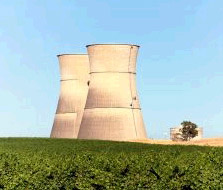UAE plans 14 nuclear plants
 The United Arab Emirates (UAE) is planning to build up to 14 nuclear power plants at a cost of £40 billion (US $79 billion) in a bid to satisfy growing demand for electricity, a report in UK newspaper, The Independent has said.
The United Arab Emirates (UAE) is planning to build up to 14 nuclear power plants at a cost of £40 billion (US $79 billion) in a bid to satisfy growing demand for electricity, a report in UK newspaper, The Independent has said.Nine engineering firms have already been pre-qualified to oversee the project, including Britain’s Amec, the newspaper added. It also suggested CH2M Hill, Bechtel and Fluor Corp. might be also on the list of contenders. An appointment is expected to be made by the end of the summer. As revealed in the June issue of Utilities Middle East, the UAE expects power demand to reach 40 858 MW by 2020.
The country needs to install an additional 21 358 MW of capacity in order to meet this demand growth. With supplies of natural gas only sufficient to fuel 20 000-25 000 MW of power, the authorities have no choice but to consider alternative sources of energy.
Early this year, the UAE government approved the development of a civilian nuclear programme, without enrichment capabilities. It has since appointed Thorium Power as a key advisor for the proposed programme.
In deals worth a combined US $8.1 million, the US nuclear energy firm is consulting on the development of a Nuclear Energy Program Implementation Organisation (NEPIO), including the structure of the body, its priorities and timetables, as well as an independent federal Nuclear Regulatory Authority (NRA).
“The UAE has always enjoyed a strong global reputation, not least because of its highly developed economy, strong geopolitical ties and progressive policies. The nation’s current commitment to exploring peaceful nuclear power is unparalleled in the Gulf region. That is why we were pleased to disclose our business consulting relationship with a UAE government entity,” the company said in a statement.
In addition to offering consultancy services, Thorium Power is developing a new low-waste nuclear fuel technology based on thorium, a naturally-occurring radioactive metal. Thorium-fuelled reactors do not produce weapons-suitable plutonium in nuclear waste. The technology has already been in research use for more than four years and the firm plans to deploy the fuel in a 1 000 MW leadtest assembly within three years.
The company says thorium is estimated to be three times more abundant than all forms of uranium combined and 100% of mined thorium is potentially useable in a reactor, compared to just 0.7% of uranium. Thorium-based nuclear power produces less than half the volume of radioactive waste, with lower radio-toxicity and a shorter half life, than conventional uranium fuel waste.
The UAE’s plans to go nuclear have been generating much excitement in the nuclear industry, with technology firms and advisors all keen to win lucrative contracts. Cooperation deals have been signed at government level between the UAE and several countries, and suppliers have also submitted proposals. But with potentially 14 contracts in the offing and £40 billion worth of investments at stake it seems likely that there will be more than one winner.
You can return to the main Market News page, or press the Back button on your browser.

